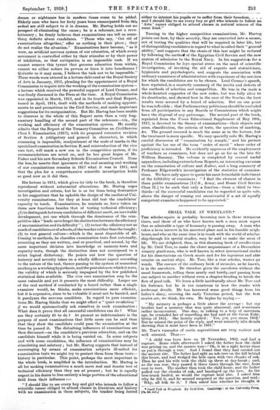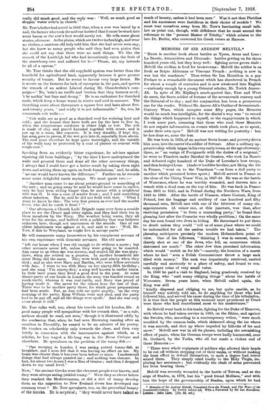SMALL TALK AT WREYLAND.* Tem scholar-squire is probably becoming rare
in these strenuous times, and those of us who have known such a man must regret that so admirable a type of humanity is passing away. A man who takes a keen interest in his ancestral place and in his humble neigh- bours, and who at the same time is in touch with the world of selio!ar- ship through his special studies, may be said to make the most of life. We are delighted, then, in this charming book of recollections by Mr. Cecil Torr, to make the closer acquaintance of a Devonshire country gentleman, who is well known in select international circles for his dissertations on Greek music and for his ingenious and able treatise on ancient ships. Mr. Torr, like a true scholar, wastes no words. The essence of the ordinary book of memoirs, as he knows, is in the anecdotes. He therefore gives the anecdotes without the usual framework, telling them neatly and briefly, and passing from one subject to another without even a chapter-heading to break the flow of good talk. We learn a little incidentally about Mr. Torr and his forbears, but he is too courteous to bore the reader with irrelevant details. He has borrowed some good things from his father's diary, covering the early Victorian period, but the beet stories are, we think, his own. He begins by saying :— " My memory is perhaps a little above the average ; but my brother had a memory that was quite abnormal, and sometimes rather inconvenient. One day, in talking to a lady of uncertain age, he reminded her of something she had said at the Great Exhi- bition of 1851. She hastily replied : Yes, yes, you mean 1862.' But he missed the point of the reply, and went minutely info details showing that it must have been in 1851."
Mr. Tory's examples of rustic superstitions are very curious and well attested. Thus :— " A child was born here on 20 November, 1902, and had a rupture. Some while afterwards I asked the father how the child was getting on, and the answer was—' Oh, it be a sight better since us put'n through a tree.' And I found that they had carried out the ancient rite. The father had split an ash-tree on the hill behind this house, and had wedged the hole open with two chunks of oak. Then he and his wife took the child up there at day-break ; and, as the sun rose, they passed it three times through the tree, from east to west. The mother then took the child home, and the father pulled out the chunks of oak, and bandaged up the tree. As the tree-trunk healed, so would the rupture heal also. I asked him why he did it, and he seemed surprised at the question, and, said : Why, all folk do it.' I then asked him whether he thought it
• Small Talk at Wreyland. By Cecil Tom Csantbridge : at the University Press. 17s. 8d. net.J really did much good,. and the reply was : Well, as mush good as sloppier' water overee in church.' "
Mr. Torr's father had noted in 1842 that, when a cow was 'awed by a nail, the farmer who took the nail out insisted that it must be stuck into some bacon or the cow's foot would surely rot. He tells some ghost stories, of course. As for pixies, which are twelve inches high, and wear no clothes, a cautious old lady told him that she had never seen any, but she knew so many people who said they had seen pixies that she could not say that there were no such things. We like the remark of the Lustleigh lad who had incautiously eaten the fruit of the strawberry-tree and suffered for it—" Please, zir, my inwards be all of a uproar."
Mr. Torr thinks that the old copyhold system was better than the leasehold for agricultural land, apparently because it gave greater security of tenure. But he seems to favour very large farms. He is severe on the farmers for lack of enterprise in the past, and quotes the remark of an ardent Liberal during Mr. Chamberlain's cam- paign—" No, 'tain't no tariffs and 'tection that they farmers need ; 't be nothin' but lime and doong." He is an enthusiast for thatched roofs, which keep a house warm in winter and cool in summer. The thatching costs about threepence a square foot and lasts about five- and-twenty years, " and really it is not inflammable." So, too, he commends cob walla :—
" Cob walls are as good as a thatched roof for resisting heat and cold ; and the houses that have both are far the best to live be, when the temperature outdoors is either high or low. The cob is made of clay and gravel kneaded together with straw, and is put up in a mass, like concrete. It is very durable, if kept dry, but soon goes to pieces, if the wet gets into it, especially from above. The roof must therefore be kept quite watertight, and the outside of the walls may be protected by a coat of plaster or cement with rough-cast."
Speaking from an evidently bitter experience, he advises against repairing old farm buildings ; " by the time I have underpinned the walls and grouted them and done all the other necessary things, I always find I could have got a better result by taking them right down and setting them up again on fresh foundations," and, he adds, " no one would have known the difference." Further on he records some more delightful rustic sayings. We must quote two :—
" Another man came to me about potato-ground or something of the sort ' • and on going away he said he would have come -in earlier, only he had been sitting longer than he meant with a neighbour who was ill. It was a case of scarlet fever ; and I said something about infection. But he said he did not hold with that. ' What I want to know be this : The very first person as ever had the scarlet fever, who did he catch it from ? ' "
" One afternoon a Church Lads' Brigade came over from a seaside place, to see the Cleave and other sights, and they had their tea in these meadows by the Wrey. The weather being warm, they all went for the stream, and bathed with a publicity that was hitherto unknown here, though not uncommon at the seaside. One of our oldest inhabitants was aghast at it, and said to me : Well, Mr. Torr, if this be Wreyleud, us might live in savage parts.' " fe will exasperate many housewives by his complacent account of his own experience with domestic servants His old nurse
" left our house when I was old enough to do without a nurse ; but other servants never left, unless they were going to be married. An came to us when she was sixteen, and stayed till she was sixty- three, when she retired on a pension. In another household her sister Betsy did the same. They were both past ninety when they died ; and so also were Mary and Martha, who were fellow-servants with Ann. I went to tea with Mary on her ninety-fifth birthday ; and she sang ' I'm ninety-five,' a song- well known in earlier times. In their later years they lived a good deal in the past. At some dinner-party at our house in London the soup was handed round as mock-turtle, whereas it was real-turtle, and Mary was proud of having made it. She never lot the others hear the last of that. 'There was to be another party there, for which great preparations had been made. But, as Ann told me quite angrily, on the very morning of the party, King William went and died, and the party had to be put off, and all the things were spoilt.' And she was very cross about it still."
Mr. Torr talks well, too, about his travels and his London life. A good many people will sympathize with his remark that, " as a rule, authors should be read, not seen," though it is illustrated oddly by the confession that, when he had seen Browning running after an omnibus in Piccadilly, he ceased to be an admirer of his poetry. He touches on scholarship only towards the close, and then very briefly in connexion with the inaccuracies against which, as a scholar, he has waged a life-long war in the Revue Critique and elsewhere. He speculates on the problem of the tunny-fish :-
" One morning in London I was eating potted tunny-fish at breakfast, and I soon felt that it was having an effect on me. My brain was clearer than it has ever been before or shwa. I understood things that had always puzzled me • and nothing was obscure. In fact, for about two hours I was a Man of Genius ; and then I dropped down to my usual level."
Now, " the ancient Greeks were the cleverest people ever known, and they were always eating pickled tunny." Were they so clever before they reached the Mediterranean, or did a diet of tunny develop them as the migration to New Zealand rivers has developed our common trout ? Mr. Torr speculates, too, on the proverbial beauty
of the Greeks. He is sceptical ; " they would never have talked so
much of beauty, unless it had been rare." Was it not that Pheidias and his successors were fastidious in their choice of models ? We must tear ourselves away from Mr. Torr's fascinating small talk. Let us point out, though, with diffidence that he must amend the reference to the " present Master of Trinity," which relates to the late Dr. Butler, who corrected his Greek verses at Harrow.



























 Previous page
Previous page